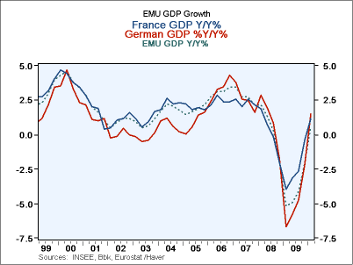 Global| Jun 04 2010
Global| Jun 04 2010GDP Edges Higher In EMU GDP Revision
Summary
· EMU GDP performed slightly better than expected in 2010-Q1. GDP is now up by 0.6% Yr/Yr the first positive Yr/Yr result since the downturn began. Austria and Italy post the strongest Q/Q numbers in 2010-Q1. Germany and France show [...]
 ·
EMU GDP performed slightly better than expected in 2010-Q1. GDP is now
up by 0.6% Yr/Yr the first positive Yr/Yr result since the downturn
began. Austria and Italy post the strongest Q/Q numbers in 2010-Q1.
Germany and France show the strongest Yr/Yr growth in Q1. The best of
the Euro-Area, on this score, trail the US, Japan and Switzerland.
·
EMU GDP performed slightly better than expected in 2010-Q1. GDP is now
up by 0.6% Yr/Yr the first positive Yr/Yr result since the downturn
began. Austria and Italy post the strongest Q/Q numbers in 2010-Q1.
Germany and France show the strongest Yr/Yr growth in Q1. The best of
the Euro-Area, on this score, trail the US, Japan and Switzerland.
Consumption in Europe continues to falter. Growth in Q1 is substantially about exports. Quite apart from the GDP figure itself Europe needs to get more balanced growth and it needs more home-grown growth. Exports rose at a 10% pace in Q1 as private consumption fell by 0.4%. Domestic demand was up mostly on government spending initiatives.
As the table shows Greece is still under pressure. The hardest thing for Greece is to have to endure a period of fiscal austerity right on the heels of a difficult recession.
Spain has posted positive growth for 2010-Q1 but it too faces fiscal austerity in the quarters ahead plus a lingering problem with its construction sector and the banking problems that have been connected with that. Portugal has not released its Q1 GDP result yet, nor has Ireland.
f there are to be synergies in the Euro-Area its member countries will have to brew home grown prosperity instead of taking it from abroad with export growth. Europe is lacking balance in a number of ways as this financial crisis and its aftermath, the euro-debt crisis, clearly demonstrate. Balance in growth is another factor lacking in the Euro-Area.
| Euro-Area and main G-10 country GDP Results | |||||||
|---|---|---|---|---|---|---|---|
| Quarter Over Quarter-Saar | Year/Year | ||||||
| GDP | Q1-10 | Q4-09 | Q3-09 | Q1-10 | Q4-09 | Q3-09 | Q2-09 |
| EMU | 0.8% | 0.5% | 1.6% | 0.6% | -2.1% | -4.1% | -4.9% |
| Austria | 3.5% | 1.3% | 2.8% | 0.8% | -1.5% | -3.6% | -5.0% |
| France | 0.5% | 2.2% | 1.0% | 1.2% | -0.4% | -2.6% | -3.2% |
| Germany | 0.6% | 0.7% | 2.9% | 1.5% | -2.2% | -4.8% | -5.8% |
| Greece | -3.1% | -3.1% | -1.9% | -2.3% | -2.5% | -2.5% | -1.9% |
| Italy | 2.1% | -0.2% | 1.5% | 0.6% | -2.8% | -4.7% | -6.1% |
| The Netherlands | 1.0% | 1.5% | 2.3% | 0.1% | -2.6% | -4.0% | -5.2% |
| Spain | 0.3% | -0.6% | -1.1% | -1.3% | -3.1% | -4.0% | -4.2% |
| UK | 1.2% | 2.0% | -1.2% | -0.2% | -3.1% | -5.3% | -5.9% |
| US | 3.0% | 5.6% | 2.2% | 2.5% | 0.1% | -2.6% | -3.8% |
| Japan | 4.9% | 4.2% | 0.5% | 4.2% | -1.4% | -4.8% | -6.0% |
| Switzerland | 1.6% | 3.5% | 2.2% | 1.7% | 0.2% | -1.4% | -2.5% |
Robert Brusca
AuthorMore in Author Profile »Robert A. Brusca is Chief Economist of Fact and Opinion Economics, a consulting firm he founded in Manhattan. He has been an economist on Wall Street for over 25 years. He has visited central banking and large institutional clients in over 30 countries in his career as an economist. Mr. Brusca was a Divisional Research Chief at the Federal Reserve Bank of NY (Chief of the International Financial markets Division), a Fed Watcher at Irving Trust and Chief Economist at Nikko Securities International. He is widely quoted and appears in various media. Mr. Brusca holds an MA and Ph.D. in economics from Michigan State University and a BA in Economics from the University of Michigan. His research pursues his strong interests in non aligned policy economics as well as international economics. FAO Economics’ research targets investors to assist them in making better investment decisions in stocks, bonds and in a variety of international assets. The company does not manage money and has no conflicts in giving economic advice.
More Economy in Brief
 Global| Feb 05 2026
Global| Feb 05 2026Charts of the Week: Balanced Policy, Resilient Data and AI Narratives
by:Andrew Cates






